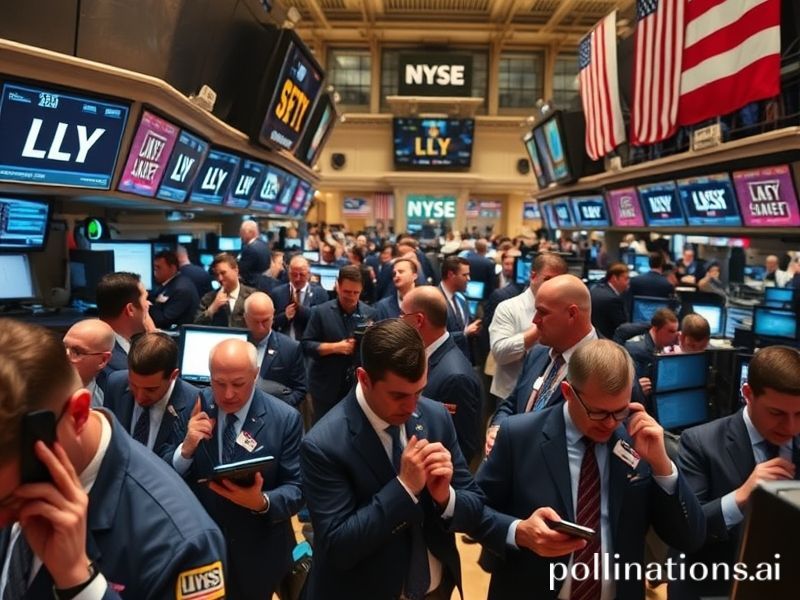Lly Stock: The Meme That Broke the Market (And Our Brains)
# **Lly Stock: The Meme That Broke the Market (And Our Brains)**
In the grand theater of internet culture, few phenomena have managed to captivate global audiences quite like the rise of “lly stock.” What started as a seemingly innocuous meme has spiraled into a full-blown financial and cultural frenzy, leaving analysts scratching their heads and meme lords reveling in their newfound power. But why is “lly stock” trending globally, and what does it say about our collective obsession with memes, markets, and mayhem?
### **The Birth of a Meme Stock**
For those who’ve been living under a rock (or, more accurately, a very stable rock), “lly stock” refers to the meme-fueled surge in the stock price of a certain company—let’s just say it rhymes with “Lily” and is a household name in the financial world. The saga began when a group of internet-savvy traders on forums like Reddit’s WallStreetBets decided to band together and drive up the stock price of this company, purely for the lulz.
What started as a joke quickly snowballed into a real-life financial phenomenon, with the stock price skyrocketing to unprecedented heights. The meme stock craze has since become a cultural touchstone, symbolizing the power of the internet to disrupt traditional markets and challenge the status quo.
### **Cultural Context: The Meme Economy**
To understand the significance of “lly stock,” we must first acknowledge the rise of the meme economy. Memes have long been a staple of internet culture, but in recent years, they’ve evolved from simple jokes into full-blown economic forces. From Dogecoin to NFTs, the internet has proven time and again that memes can drive real-world value—and “lly stock” is just the latest example.
The cultural impact of “lly stock” extends beyond finance. It’s a testament to the power of collective action and the democratization of information. In a world where traditional institutions often seem out of touch, the rise of “lly stock” represents a rebellion against the establishment. It’s a middle finger to the suits on Wall Street, a rallying cry for the little guy, and a reminder that the internet can be a force for change.
### **Social Impact: The Rise of the Retail Investor**
One of the most significant aspects of the “lly stock” phenomenon is the rise of the retail investor. Thanks to the proliferation of trading apps and social media, everyday people now have the tools and knowledge to participate in the stock market like never before. The “lly stock” craze has empowered a new generation of investors, proving that you don’t need a fancy degree or a Wall Street pedigree to make waves in the market.
Of course, the “lly stock” frenzy hasn’t been without its controversies. Critics have accused the meme stock traders of market manipulation, while others have raised concerns about the potential for financial ruin. But for many, the risks are worth it. The thrill of being part of something bigger than oneself, the camaraderie of the meme stock community, and the sheer audacity of taking on the establishment—these are the things that drive people to participate in the “lly stock” phenomenon.
### **Why It Matters**
So, why should we care about “lly stock”? Because it’s more than just a meme or a stock ticker symbol. It’s a cultural moment that encapsulates the spirit of our times. It’s a reflection of our collective desire for agency, our hunger for disruption, and our love of a good joke.
The “lly stock” phenomenon also raises important questions about the future of finance. As meme stocks continue to gain traction, traditional financial institutions are being forced to adapt. The lines between finance and internet culture are blurring, and the implications are far-reaching. Will meme stocks become a mainstream investment strategy, or will they fade into obscurity like so many other internet fads? Only time will tell.
### **Conclusion: The Meme Stock Revolution**
In the end, “lly stock” is a reminder that the internet is a powerful force for change. It’s a testament to the power of collective action, the democratization of information, and the sheer absurdity of our digital age. Whether you’re a seasoned investor or a meme enthusiast, there’s no denying the cultural significance of “lly stock.”
So, as the meme stock revolution continues to unfold, one thing is clear: the internet has spoken, and the world is listening. And if there’s one lesson to be learned from the “lly stock” phenomenon, it’s this: never underestimate the power of a good meme.







